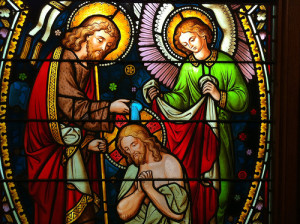 Mark 1:9-11 portrays the “kick-off” event of Jesus’ public ministry. He would have been about 30 years old and it is the only time we see him and John the Baptist together in scripture. Mark is minimal in detail about this event, seeming to just give us the facts. But these facts pack a punch.
Mark 1:9-11 portrays the “kick-off” event of Jesus’ public ministry. He would have been about 30 years old and it is the only time we see him and John the Baptist together in scripture. Mark is minimal in detail about this event, seeming to just give us the facts. But these facts pack a punch.
In those days Jesus came from Nazareth of Galilee and was baptized by John in the Jordan. And when he came up out of the water, immediately he saw the heavens being torn open and the Spirit descending on him like a dove. And a voice came from heaven, “You are my beloved Son; with you I am well pleased.
The first question to pop in your mind after reading this passage may be, “Why did Jesus need to be baptized when he was without sin?” That is a great question, but the answer is not in this passage, so we won’t go down that detour now. Read Matthew 3:15 for a start on the answer.
For now, let’s focus on the main idea of this passage, which I believe is the final quote from the heavenly voice: “You are my beloved Son; with you I am well pleased.” Let me tell you why you should lean in and really listen to this sermon about the Son: The Bible says that both your soul’s fate and quality if your everyday life hinge on your understanding of and belief in the Son—as well as the fates and lives of everyone you care about.
So even if you’ve heard all this before, and even if you’ve been changed by Christ and he lives within you, like Paul says in Galatians 2:20, “the life I now live in the flesh I live by faith in the Son of God.”
As Christians we live our everyday life by everyday faith in the Son of God. So even if you’ve been a Christian for 75 years, you need to behold the Son this morning.
And that has been my prayer as I’ve meditated on this passage. This Christmas may we behold and believe the Son of God.
Behold the Son
Back to our passage:
And when [Jesus] came up out of the water, immediately he saw the heavens being torn open and the Spirit descending on him like a dove. And a voice came from heaven, ‘You are my beloved Son; with you I am well pleased.’
Try to imagine this event. The sky rips open. Something glorious descends from the opening, all the way down until it rests on Jesus. It isn’t sudden and violent like a lightning bolt. Rather it’s gentle and graceful like a dove. Then the heavenly voice. Is this not a bizarre scene?
God has done so much through the invisible work of the Spirit and the silent work of the voice. Why in this instance were they visible and audible? Something similar happened in John 12:28-30:
Father, glorify your name.” Then a voice came from heaven: “I have glorified it, and I will glorify it again.” The crowd that stood there and heard it said that it had thundered. Others said, “An angel has spoken to him.” Jesus answered, “This voice has come for your sake, not mine.”
The Jews had been looking for their Messiah for many generations according to Old Testament prophecies like Isaiah 11:1-2 and 42:1.
There shall come forth a shoot from the stump of Jessie, and a branch from his roots shall bear fruit. And the Spirit of the LORD shall rest upon him…
Behold my servant, whom I uphold, my chosen, in whom my soul delights; I have put my Spirit upon him…
The descent of the Spirit was not a random supernatural phenomenon. It was a giant puzzle piece slipping to place. It meant the “shoot from the stump of Jessie,” the “branch from his roots,” God’s special chosen servant – the long awaited Messiah had arrived!
It was for the sake of the people within earshot that God spoke audibly in this instance, and I believe it was for the same purpose in Mark 1:11—so that they (and we) would know that Jesus is the Son of God.
This was certainly the case for John the Baptist in John 1:32-34.
And John bore witness: “I saw the Spirit descend from heaven like a dove, and it remained on him. I myself did not know him, but he who sent me to baptize with water said to me, ‘He on whom you see the Spirit descend and remain, this is he who baptizes with the Holy Spirit.’ And I have seen and have born witness that this is the Son of God.
This Christmas, we need to hear and remember that Jesus is more than a historical figure, more than a role model and more than a moral teacher. Jesus is the Son of God.
C.S. Lewis wrote (in Mere Christianity):
For when you get down to it, is not the popular idea of Christianity simply this: that Jesus Christ was a great moral teacher and that if only we took His advice we might be able to establish a better social order and avoid another war? Now, mind you, that is quite true. But it tells you much less than the whole truth about Christianity and it has no practical importance at all.
It is quite true that if we took Christ’s advice we should soon be living in a happier world. You need not even go as far as Christ. If we did all that Plato or Aristotle or Confucius told us, we should get on a great deal better than we do. And so what? We never have followed the advice of the great teachers. Why are we likely to begin now? Why are we likely to begin now? … Because [Christ] is the best moral teacher? But that makes it even less likely that we shall follow Him. If we cannot take the elementary lessons, is it likely we are going to take the most advanced one? If Christianity only means one more bit of good advice, then Christianity is of no importance. There has been no lack of good advice for the last four thousand years. A bit more makes no difference.
But as soon as you look at any real Christian writings, you find that they are talking about something quite different form this popular religion. They say that Christ is the Son of God (whatever that means).
This Christmas let’s behold Jesus Christ with fresh eyes and see that he is absolutely unique—uniquely authoritative, uniquely powerful—the Son of God, and in light of these things ask ourselves one very important question: Do I believe in him?
Believe the Son
If Jesus were merely a great historical figure, we would only need to ask if we properly revere his memory. If he were merely a role model, we would only need to ask if we give him credit as such and perhaps try to emulate him as best we can. If he were merely a moral teacher, we would need to ask if we are attempting to incorporate his lessons into our lives. But since he is the Son of God, we need to ask if we believe in him.
It would be ridiculous to revere, emulate or listen to a man’s teaching who claimed to be the Son of God unless we truly believe that he is the Son of God. Imagine you’ve found a self-help author who seems to have great insights and clever ideas to improve your life, but he thinks he’s a unicorn. Is that delusion not a deal breaker? If we do not believe Jesus is the Son of God, we must discard him and his advice. But if we believe that he is the Son of God, we must do more than revere, emulate and listen to him, we must entrust ourselves to him.
To believe in the Son of God is to trust him more fully that you trust any other human being on the earth—more than great historical figures, more than any role model, more than any other teacher, more than your closest confidant, more than your dearest friend, more than your closest family.
To believe in the Son of God is to recognize his authority above all other authorities—above any author, professor, expert, politician, self-help guru and even yourself.
To believe in the Son of God is to take his promises as facts. Promises like, “Seek first the kingdom of God and his righteousness, and all these things (food, clothes and all the concerns of life) will be added to you” (Matthew 6:33). You who are plagued with anxiety, behold and believe in the Son of God!
To believe in the Son of God is to be freed from condemnation. “Whoever believes in him is not condemned, but whoever does not believe is condemned already, because he has not believed in the name of the only Son of God” (John 3:18).You who are living under a heavy burden of guilt and shame and condemnation, behold and believe in the Son of God!
To believe in the Son of God is to have true abundant life. “But these [signs of Jesus] are written so that you may believe that Jesus is the Christ, the Son of God, and that by believing you may have life in his name” (John 20:31). You who feel like the walking dead, living a life of darkness and depression, behold and believe in the Son of God!
To believe in the Son of God is to overcome the world. “Who is it that overcomes the world except the one who believes that Jesus is the Son of God?” (1 John 5:5). You who are defeated by the world, overrun with temptations, swept up into corruption, behold and believe in the Son of God!
To believe in the Son of God is to live in concrete confidence in your eternal security. “I write these things to you who believe in the name of the Son of God that you may know you have eternal life” (1 John 5:13). You who fear death, behold and believe in the Son of God!
To believe in the Son of God is to rest in his wise and loving answer to every single prayer you pray (1 John 5:14-15). “And this is the confidence that we have toward him, that if we ask anything according to his will he hears us. And if we know that he hears us in whatever we ask, we know that we have the requests that we have asked of him” (1 John 5:14-15). You who are hemmed in by insecurities, behold and believe in the Son of God!
Conclusion
Let’s celebrate Christ this Christmas. Let’s look at him with fresh eyes and remember that he is the Son of God. Let’s behold him and believe him.
Discussion Starters
- Read Mark 1:9-11. What strikes you most about this passage?
- Why was Jesus baptized? (Read Matthew 3:13-15 for Jesus’ answer. And read this article by John MacArthur for further insight: http://www.gty.org/resources/bible-qna/BQ33111/.)
- What are some differences between being the Son of God and being a great historical figure, a role model or a moral teacher?
- What are some implications of these differences for the way we should relate to Jesus?
- Read the following Scriptures together, asking: What difference does this verse make in my life? John 3:18; John 20:31; 1 John 5:5 and 1 John 5:14-15.
- What are some practical ways we can celebrate Christmas that will instill in our hearts, our families and our church that Jesus is the Son of God?
Picture by Jonathan Teixeria. (http://www.flickr.com/photos/jonteixeira/)




